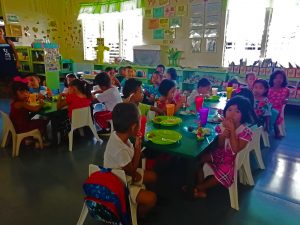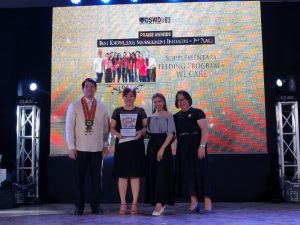The Supplementary Feeding Program (SFP), one of the Social Protection Programs being implemented by the Department of Social Welfare and Development (DSWD), is the provision of food in addition to the regular meals to children currently enrolled in the day care centers/elementary schools, as part of the DSWD’s contribution to the Early Childhood Care and Development (ECCD) program of the government.
Through the program, children are provided hot meals served during break/snack time. This is to address the prevalent issue of malnutrition among children, especially those 3-12 years old. Children enjoy the program for 120 days, in which, constant monitoring of their weight is done, to assess the impact of the provision of the meals to the health status of the children.
Malnutrition is an umbrella term for poor nutrition, whether that is excess consumption of nutrients (over nutrition) or inadequate consumption or absorption of one or more nutrients (undernutrition). However, the issue of undernutrition has been one of the threat’s to a child’s life. Undernutrition Is lack of proper nutrition, caused by not having enough food, not eating enough food containing substances necessary for growth and health, and other direct and indirect causes.
According to Ma. Lea Alegarbes, Nutritionist Dietician III at DSWD Field Office Caraga, “Every child has the right to acquire good nutrition. It is essential for life and they have the right to enjoy the quality of life. Children need to be given all the opportunities to learn in order to acquire skills and abilities to fully develop their potentials”.
With this, SFP provides freshly prepared meals (pre-planned meal cycles) to school children, five (5) times a week. The food is prepared by parent-volunteers, using locally available indigenous food materials.

But even though the program is implemented religiously, and even though children do not skip any of the feeding sessions, there are still a few who show no signs, or minimal improvements. Since the implementation of SFP, the Agency discovered that there are still children who are malnourished after the 120 days of feeding program, that is why the Field Office strategized and looked for solutions to address the issue.
The program handlers came up with WE CARE (Weight Efforts on Children in need for Assistance, Rehabilitation and Enrichment) Project, a good practice/innovation which provides services to children who remained undernourished after the 120 days DSWD Supplementary Feeding Program implementation.
The project targets children as subject for case management, especially those children in rural and urban areas where undernutrition is high. WE CARE Project is designed to identify the root causes of undernutrition of a beneficiary so it would be addressed. The project involves the beneficiary (child), the parents, the Local Government Unit, and utilizes the resources of DSWD’s other programs like the Sustainable Livelihood Program, the Pantawid Pamilyang Pilipino Program, and the Social Pension for Indigent Senior Citizen Program, and other entities and stakeholders.
WE CARE Project aims to: identify the main factors and contributing factors why the child is experiencing undernutrition; identify appropriate interventions to help improve and sustainthe nutritional status of the undernourished child; and to contribute in uplifting the socio-economic condition of the family whose child is affected with undernutrition.
Iona Cielo Azarcon, Social Welfare Officer I under the SFP emphasized that the WE CARE Project is trying to address malnutrition because “malnutrition is robbing the child of every opportunity in life.” She added that if it is not addressed, “children will remain non-productive, especially in school.”
DSWD Field Office Caraga abides on its May Malasakit brand of service. This is why the SFP handlers do not just implement the program, but assess the impact of the program and see to it that the program hits its targets.
The WE CARE project is considered a good practice for the Field Office, since not all DSWD Field Offices implement the project. In 2019, the WE CARE initiative was recognized as one of the Best Knowledge Management Initiatives in the region.
Being the lead agency that promotes social welfare and development to the Filipino people, it is mandated to provide for the best welfare of the poor, marginalized, and disadvantaged. And true enough, this was realized with the initiative done through the Supplementary Feeding Program.


